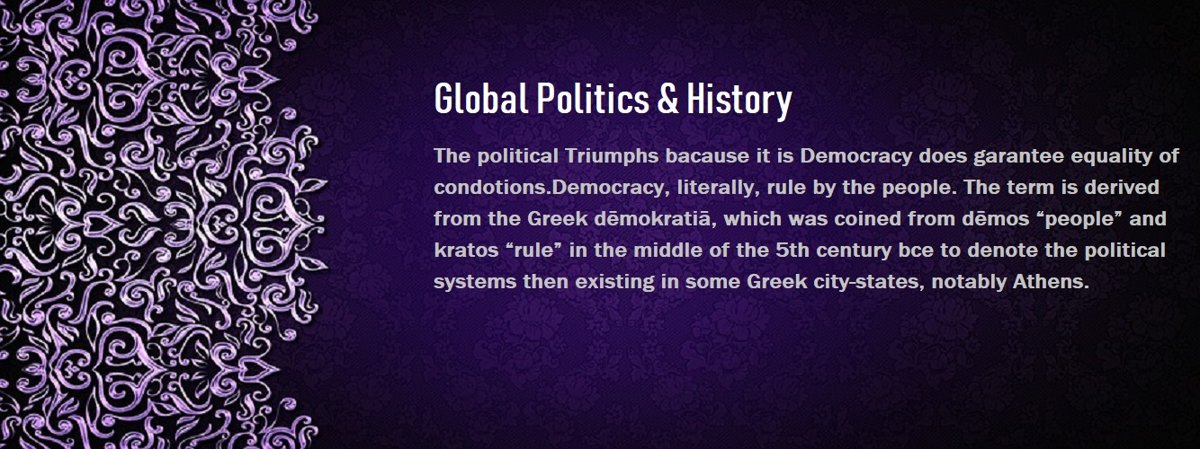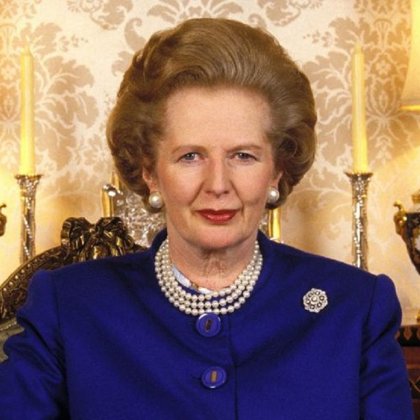MARGARET THATCHER "IRON LADY" (1925 – 2013) WAS THE BRITISH FIRST FEMALE PRIME MINISTER. THE GROCER'S DAUGHTER ROSE IN POLITIC WITH A STRONG FREE- MARKET PHILOSOPHY.HER STRENGTH MADE HER AN ICON TO CONSERVATIVES IN MANY PARTS OF THE WORLD.
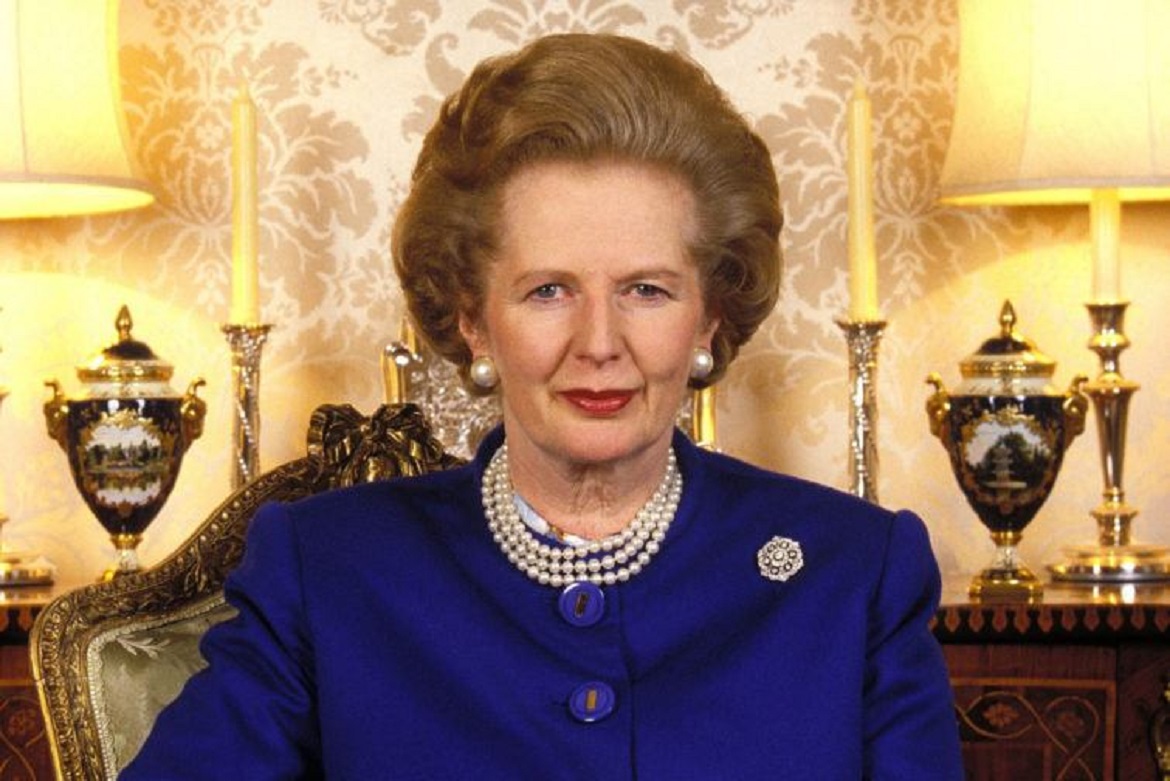 Margaret
Thatcher may not have had the reputation of being the best of mothers
or wives since her life was focused on politics, but as a woman, she
marked a “before” and an “after” in the 20th century. Although some of
her decisions were controversial (some economic measures, the Falklands
war, etc.), she always remained strong in order to govern in a
male-dominated world and to achieve what she felt were the right steps
leading toward Great Britain’s economic recovery and the end of
communism.
Margaret
Thatcher may not have had the reputation of being the best of mothers
or wives since her life was focused on politics, but as a woman, she
marked a “before” and an “after” in the 20th century. Although some of
her decisions were controversial (some economic measures, the Falklands
war, etc.), she always remained strong in order to govern in a
male-dominated world and to achieve what she felt were the right steps
leading toward Great Britain’s economic recovery and the end of
communism.
Margaret Thatcher has been announced as the most influential woman of the last seven decades.Thatcher was one of the most iconic leaders of the 20th century, regardless of gender.Thatcher
opposed Heath at the party convention of 1975, when senior alternatives
declined to bell the cat. She was elected leader of the opposition,
slogged through four years in that role, and only narrowly won the 1979
general election over James Callaghan,
although Britain was being closely monitored by the IMF; sluggish
economic growth and a labour movement that shut down anything on a whim
of local officials and was completely out of control. The metropolitan
London garbage collectors and even the undertakers were on strike in the
winter of early 1979, while London suffered extensive electricity
brown-outs two and three days a week because of union industrial action.Despite
the lamentable state of the country, Thatcher’s victory was narrow
because of her radical program and, it is conjectured, because she was
the country’s first major-party female leader. When she was elected
leader, and went to the Conservative Party’s informal social
headquarters, the Carlton Club, she was told that ladies were not
allowed, other than as guests. “They are now,” she famously said as she
sailed majestically past the concierge.Revolutionized
the UK economy through free-market policies that included cuts to the
British welfare state and the sale of government-owned industries. She
also had a laser-focus on the traditionally conservative goal of cutting
the deficit and balancing the budget and she was willing to raise
taxes to achieve that goal.A
woman with high standards and a short temper, Margaret Thatcher was not
known as Britain's Iron Lady for nothing. After working as both a
chemist and a barrister and having two children, Thatcher saw her
long-held political ambitions realized in 1959 when she became a Member
of Parliament in the Conservative Party. Twenty years later, she found
herself Prime Minister. Serving from 1979 to 1990, she was Europe's
first female Prime Minister and the only British Prime Minister to serve
three consecutive terms. During her 11 years in the position, she
worked against a fair amount of resistance to turn Britain into a more
entrepreneurial free-market economy. Thatcher advocated for the
privatization of state industries, pressed for lower taxes, faced trade
unions head-on and reduced social expenditures across the board. Along
with Ronald Reagan, her conservative partner across the Atlantic, she is
also credited with helping to hasten the demise of the Soviet Union.The authority she gained did not mean there were not mistakes along
the way. Some economists blame her governments for wrecking British
manufacturing. They say it was under Thatcher's financial ministers that
chronic underspending on Britain's public services created problems
that are still being rectified today. Critics contend that hers was not a
tolerant society and she ensured that Britain's role in Europe become
that of permanent irritant rather than profitable partner.Aided
and abetted by sections of the media, it seemed Thatcher came to believe
in the myth of her own invincibility. That was what led her into
mistakes including the poll tax a charge that saw dukes and domestic
cleaners paying the same local dues and increasingly shrill
anti-Europeanism, which alarmed even her own party and eventually led
them to discard a leader who had won them three consecutive elections.Thatcher's
vote-winning drive had forced Britain's other parties to change their
thinking to remain in touch with the electorate. But when the poll tax -
a levy on individuals -- and her "no, no, no" response to Europe
frightened her party into dumping her in 1990, they woke up the next
morning and felt guilty about what they had done to their one-time
heroine.Thatcher's strength and drive made her an icon to conservatives in
many parts of the world, especially in eastern Europe. She possessed the
certainties of a tabloid newspaper editor, and her eagerness to see the
power of central government reduced even made her a heroine to some of
today's Tea Party enthusiasts in the United States. Few European
politicians since have been so capable of drawing an American audience.The
irony though is that while her election results show the pull she
exerted through her strong leadership, her populist streak and her
raising of the British profile, many Britons never really identified
with the underlying values of the woman who became, both in her time as
prime minister and in the years to come, a national icon.
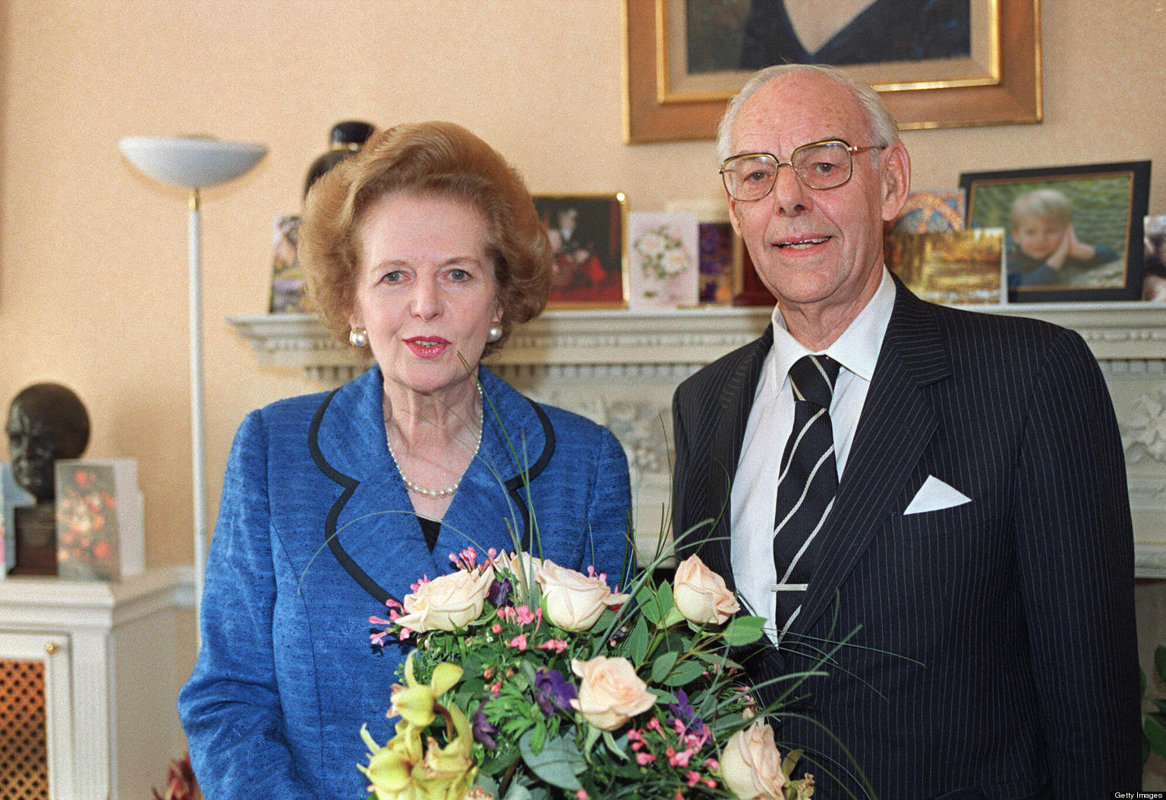 Former
British prime minister Margaret Thatcher’s marriage almost ended in
divorce after her husband, Sir Denis Thatcher, suffered a nervous
breakdown, a new book claims. Sir Denis made a full recovery after a
two-month break in South Africa and later sold his company to Castrol.
He died in June 2003, at age 88.Lady Thatcher, who married Sir Denis in
1942, would come to rely heavily on her husband during her 11 years in
power.
Former
British prime minister Margaret Thatcher’s marriage almost ended in
divorce after her husband, Sir Denis Thatcher, suffered a nervous
breakdown, a new book claims. Sir Denis made a full recovery after a
two-month break in South Africa and later sold his company to Castrol.
He died in June 2003, at age 88.Lady Thatcher, who married Sir Denis in
1942, would come to rely heavily on her husband during her 11 years in
power.
Thatcher became prime minister in 1979, a full year and a half before Ronald Reagan became president. She hailed from a country seen as a hopeless bastion of socialism by conservatives, many of whom, like Reagan himself, were strongly invested in the idea of American exceptionalism.At the end of the 1970s, "a lot of conservative intellectuals in the United States thought Europe is lost and that America is next," says Arthur Brooks, president of the conservative American Enterprise Institute. "Thatcher's voice came out of the wilderness and said, 'Freedom matters.' "Her rise was equally improbable because of her gender. She was her country's first female prime minister, a possibility she publicly doubted just six years before occupying No. 10 Downing Street.Reagan called her "the best man in England," and she decried notions of feminism as being the sole purview of the left. Writer and campaigner Natasha Walter has written that Thatcher "normalized female success. She showed that although female power and masculine power may have different languages, different metaphors, different gestures, different traditions, different ways of being glamorous or nasty, they are equally strong, equally valid."Thatcher once quipped that "well behaved women seldom make history" and remarked that "in politics, if you want anything said, ask a man. If you want anything done, ask a woman."Just as Reagan helped move conservatism from the fringes of American politics, Thatcher, with her wit and intelligence, helped do the same on the international stage.In 1981, Margaret Thatcher faced the greatest challenge of her premiership. After nearly two years in office, the British economy was in a bad condition; unemployment had reached levels not seen since the 1930s; the public finances were in the worst condition since 1945. The Economist memorably describes her on 21st March, 1981:“Mrs Thatcher is emerging from her second year of office as one of the most extraordinary leaders in modern politics. Her country is in deep recession. Her Cabinet is not so much divided as bewildered. Her once adoring backbenchers are either mutinous or glum. And she has speaking out against her almost every traditional Tory interest: private industry, the City, the counties, the universities, the senior civil service, the ‘defence' establishment.She faced a resurgent social democratic liberalism, and by common consent had just a few months to save her premiership. Instead, in less than 180 days, she reinvented conservatism, showed a ruthless willingness to cut the traditionalists from her government, and promoted a new technocratic generation of fervent right-wingers who would be devoted to her until her final days.Thatcher's Trial is a short focused history, an investigation of a slice in time. It is also a study in the nature of personality and the ability of individuals to shape events in politics and history. Its narrative is largely drawn from newspapers, archival material from both the Churchill Archive at Churchill College, Cambridge, where Margaret Thatcher's papers have been deposited, and at the National Archive. The memoirs of Thatcher's contemporaries such as Nigel Lawson, Norman Tebbit, Michael Heseltine and others also form an invaluable resource of primary material for this incisive history.Thatcher's Trial shows how, in a dazzlingly short time, Thatcher transformed the Conservative Party from one that belonged to Westminster, The Guards and Whites Club, to an utterly unrecognizable institution that opened conservatism to the masses.Thatcher recalled her first meeting with Ronald Reagan, in 1975, when she was leader of the opposition and he was governor of California. That same year, Thatcher cemented her status among American conservatives with her appearance on William F. Buckley Jr.'s mouthpiece Firing Line. Luke Coffey, who was an adviser to the British government before becoming a Margaret Thatcher Fellow at the Heritage Foundation, says she was a wellspring of inspiration to the American conservative movement.That determination was exemplified by one of her most famous lines. In 1980, as many wondered if she would make a U-turn in response to push back against her economic policies, Thatcher said: "You turn if you want to. The lady's not for turning."On the international stage, the personal relationship between Reagan and Thatcher, which predated either of them becoming national leaders, blossomed into a "special relationship" between the two countries that was reminiscent of World War II as President Franklin Roosevelt and Prime Minister Winston Churchill worked in concert to defeat the Axis powers. But that relationship had worn thin in the intervening years. When Thatcher and Reagan assumed power. "The U.K. was more aligned with the ideology of Europe than with the United States at many points leading up to 1980.The touchstone event that came to symbolize the new relationship came in 1982, when Argentina's military junta occupied the Falkland Islands, a British territory that Buenos Aires claimed as its own.Thatcher responded militarily, and the U.S. backed her."Thatcher has said that without help from the U.S., including U.S. Sidewinder anti-aircraft missiles, Britain would not have been able to liberate the Falklands.
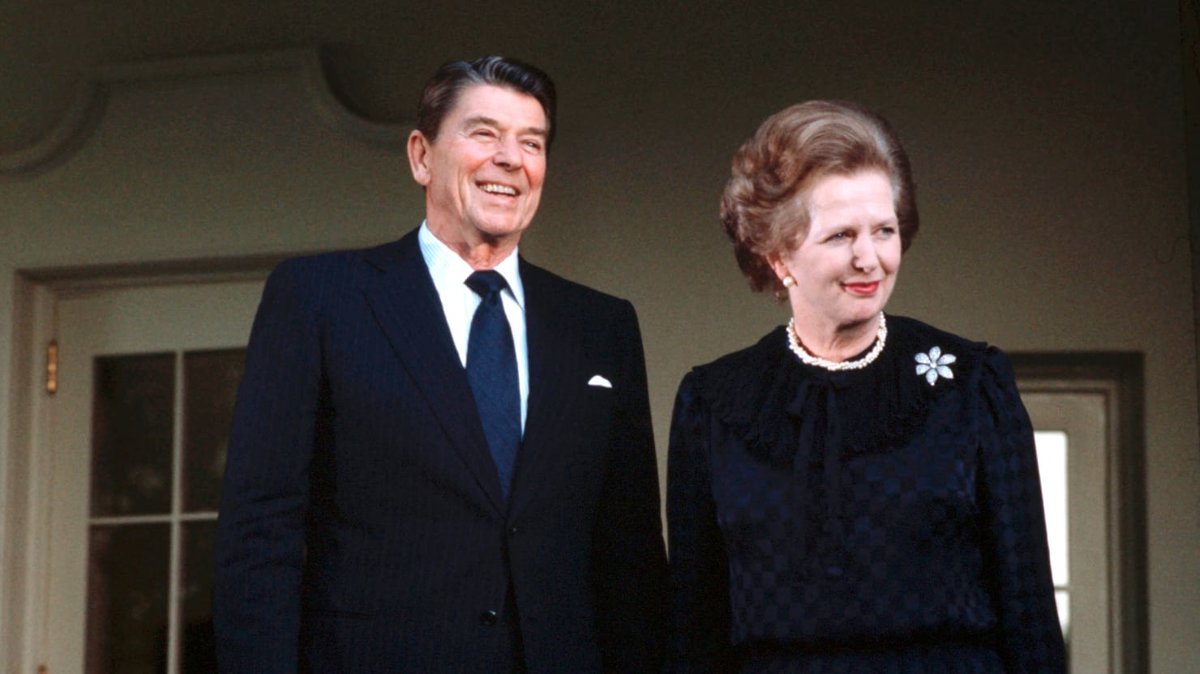 Ronald
Reagan: Margaret Thatcher was my dearest friend.During the Thatcher
years, the special relationship between Britain and America was elevated
to heights never achieved before or since.She and US president Ronald
Reagan came to power at a critical time in world history and united to
bring an end to the Cold War and change the face of international
politics.
Ronald
Reagan: Margaret Thatcher was my dearest friend.During the Thatcher
years, the special relationship between Britain and America was elevated
to heights never achieved before or since.She and US president Ronald
Reagan came to power at a critical time in world history and united to
bring an end to the Cold War and change the face of international
politics.
Margaret Thatcher had visited India in September 1976 as an opposition leader, three years before she became prime minister, at the invitation of Indira Gandhi. The British press had criticised her for her comment post-visit: "I came to learn and not to comment.""In spite of a long self justificatory account she gave me of why the state of emergency had been necessary, I could not approve of her government's methods," said Thatcher, who was called the Iron Lady for the way she handled some pressing labour issues."She had taken a wrong turning and was to discover the fact at her Party's devastating election defeat in 1977.Whatever misgivings Thatcher had about India’s socialist command economy in the 1970s and 80s and the temporary suspension of India’s Constitution under Mrs. Gandhi’s rule, her appraisal of the Indian prime minister was always laudatory. Biographer Hugo Young concluded that Thatcher admired Mrs. Gandhi as her first and only female role model in politics.Margaret identified with Indira’s interest in practical issues such as agriculture, and she liked to say that women leaders, such as Indira and herself, were more attuned to the problems of daily life than most men in government. Both attended Somerville College at Oxford, yet they also performed household duties throughout their lives and had carried out roles traditionally associated with being a wife, mother, daughter, and hostess. Gandhi took great pride and interest in household decor and floral arrangements. Thatcher prepared breakfast daily for her husband even while she was leader of the United Kingdom.Although Margaret Thatcher and Indira Gandhi held different views on the role of markets in society, the two women forged a remarkably friendly relationship. Based on Mrs. Thatcher's memoirs and other biographical sources about these two, we can see that Gandhi and Thatcher possessed a similar blend of steel and pragmatism that made them unexpectedly good war leaders and transformative figures in their respective nations.The iron fisted managerial style seemed similar, as did their impatience with political dissidence.Mrs. Thatcher in her memoirs also recalls the lunch hosted by Mrs. Gandhi at her Safdarjung road home in Delhi in 1976 before the Tory leader became the prime minister.“I lunched with Indira Gandhi in her own modest home, where she insisted on seeing that her guests were all looked after and clearing away the plates while discussing matters of high politics,” she said.Mrs. Thatcher said she naturally sympathised with a woman politician faced with the huge strains and difficulties of governing a country as vast as India.“But, in spite of a long self justificatory account she gave me of why the state of emergency had been necessary, I could not approve of her government’s methods. She had taken a wrong turning and was to discover the fact at her Party’s devastating election defeat in 1977,” she said.When Gandhi was assassinated in 1984 (Just 15 days after an IRA bombing attack on Thatcher), a teary eyed Thatcher had said, "I will miss Mrs Indira Gandhi very much indeed. She was a truly great leader.Thatcher had headed to Teen Murti Bhavan in New Delhi where she laid a wreath on the body of 67-year-old Gandhi lying in state after her arrival from London to attend the funeral of the Indian leader who was assassinated on October 31, 1984."I will miss Mrs Indira Gandhi very much indeed,".Indira Gandhi (1917-1984) was the only child of the first Indian Prime Minister Jawaharlal Nehru. She spent part of her childhood in Allahabad, where the Nehrus had their family residence, and part in Switzerland, where her mother Kamla convalesced from her periodic illnesses. She received her college education at Somerville College, Oxford. A famous photograph from her childhood shows her sitting by the bedside of Mahatma Gandhi, as he recovered from one of his fasts; and though she was not actively involved in the freedom struggle, she came to know the entire Indian political leadership. After India's attainment of independence, and the ascendancy of Jawaharlal Nehru, now a widower, to the office of the Prime Minister, Indira Gandhi managed the official residence of her father, and accompanied him on his numerous foreign trips. She had been married in 1942 to Feroze Gandhi, who rose to some eminence as a parliamentarian and politician of integrity but found himself disliked by his more famous father-in-law, but Feroze died in 1960 before he could consolidate his own political forces.In 1964, the year of her father's death, Indira Gandhi was for the first time elected to Parliament, and she was Minister of Information and Broadcasting in the government of Lal Bahadur Shastri, who died unexpectedly of a heart attack less than two years after assuming office. The numerous contenders for the position of the Prime Ministership, unable to agree among themselves, picked Indira Gandhi as a compromise candidate, and each thought that she would be easily manipulable. She held the office of the Prime Minister from 1966 to 1977. She was riding the crest of popularity after India's triumph in the war of 1971 against Pakistan, and the explosion of a nuclear device in 1974 helped to enhance her reputation among middle-class Indians as a tough and shrewd political leader. However, by 1973, Delhi and north India were rocked by demonstrations angry at high inflation, the poor state of the economy, rampant corruption, and the poor standards of living. In June 1975, the High Court of Allahabad found her guilty of using illegal practices during the last election campaign, and ordered her to vacate her seat. There were demands for her resignation.Mrs. Gandhi's response was to declare a state of emergency, under which her political foes were imprisoned, constitutional rights abrogated, and the press placed under strict censorship. Meanwhile, the younger of her two sons, Sanjay Gandhi, started to run the country as though it were his personal fiefdom, and earned the fierce hatred of many whom his policies had victimized. He ordered the removal of slum dwellings, and in an attempt to curb India's growing population, initiated a highly resented program of forced sterilization. In early 1977, confident that she had debilitated her opposition, Mrs. Gandhi called for fresh elections, and found herself trounced by a newly formed coalition of several political parties. Her Congress party lost badly at the polls. Many declared that she was a spent force; but, three years later, she was to return as Prime Minister of India.
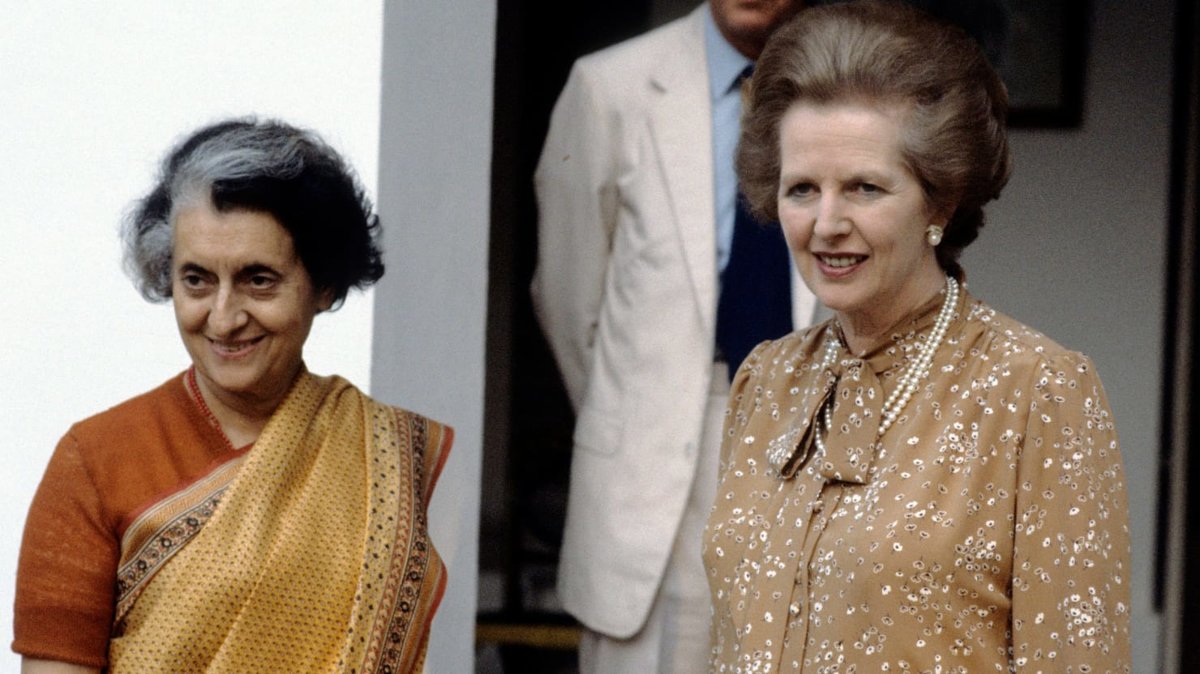 Although
Margaret Thatcher and Indira Gandhi held different views on the role of
markets in society, the two women forged a remarkably friendly
relationship. Based on Mrs. Thatcher's memoirs and other biographical
sources about these two, we can see that
Gandhi and Thatcher possessed a similar blend of steel and pragmatism
that made them unexpectedly good war leaders and transformative figures
in their respective nations.Both attended Somerville College at Oxford.
Although
Margaret Thatcher and Indira Gandhi held different views on the role of
markets in society, the two women forged a remarkably friendly
relationship. Based on Mrs. Thatcher's memoirs and other biographical
sources about these two, we can see that
Gandhi and Thatcher possessed a similar blend of steel and pragmatism
that made them unexpectedly good war leaders and transformative figures
in their respective nations.Both attended Somerville College at Oxford.